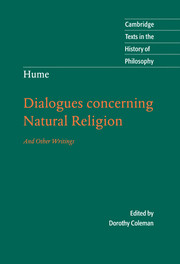Book contents
- Frontmatter
- Contents
- Acknowledgments
- Introduction
- Chronology
- Further reading
- Note on the text
- List of abbreviations
- DIALOGUES CONCERNING NATURAL RELIGION
- OTHER WRITINGS
- From Hume's memoranda
- Fragment on evil
- Letter to Francis Hutcheson, March 16, 1740 (extract)
- Letter to William Mure, June 30, 1743 (extract)
- Letters to Gilbert Elliot (extracts)
- From The Natural History of Religion
- Selections from Bayle
- Index
- Cambridge Texts in the History of Philosophy
Letter to William Mure, June 30, 1743 (extract)
Published online by Cambridge University Press: 05 June 2012
- Frontmatter
- Contents
- Acknowledgments
- Introduction
- Chronology
- Further reading
- Note on the text
- List of abbreviations
- DIALOGUES CONCERNING NATURAL RELIGION
- OTHER WRITINGS
- From Hume's memoranda
- Fragment on evil
- Letter to Francis Hutcheson, March 16, 1740 (extract)
- Letter to William Mure, June 30, 1743 (extract)
- Letters to Gilbert Elliot (extracts)
- From The Natural History of Religion
- Selections from Bayle
- Index
- Cambridge Texts in the History of Philosophy
Summary
Editor's note: William Mure (1718–76) was one of Hume's lifelong friends. William Leechman (1706–85) became Mure's tutor about 1727. He was ordained as a minister in 1736 and was appointed Professor of Divinity at the University of Glasgow in 1743, shortly before Hume wrote this letter. He was a member of Francis Hutcheson's circle, contributing to the moderation of strict orthodoxy among the Scottish clergy. His sermon, about which Hume's letter comments, was published as The Nature, Reasonableness, and Advantages of Prayer: A Sermon (Glasgow, 1743).
I have read Mr. Leechman's sermon with a great deal of pleasure, and think it a very good one; though I am sorry to find the author to be a rank atheist. You know (or ought to know) that Plato says there are three kinds of atheists. The first who deny a deity, the second who deny his providence, the third who assert, that he is influenced by prayers or sacrifices. I find Mr. Leechman is an atheist of the last kind …
As to the argument I could wish Mr. Leechman would in the second edition answer this objection both to devotion and prayer, and indeed to everything we commonly call religion, except the practice of morality, and the assent of the understanding to the proposition that God exists.
It must be acknowledged that nature has given us a strong passion of admiration for whatever is excellent, and of love and gratitude for whatever is benevolent and beneficial, and that the deity possesses these attributes in the highest perfection and yet I assert he is not the natural object of any passion or affection.
- Type
- Chapter
- Information
- Hume: Dialogues Concerning Natural ReligionAnd Other Writings, pp. 115 - 117Publisher: Cambridge University PressPrint publication year: 2007

